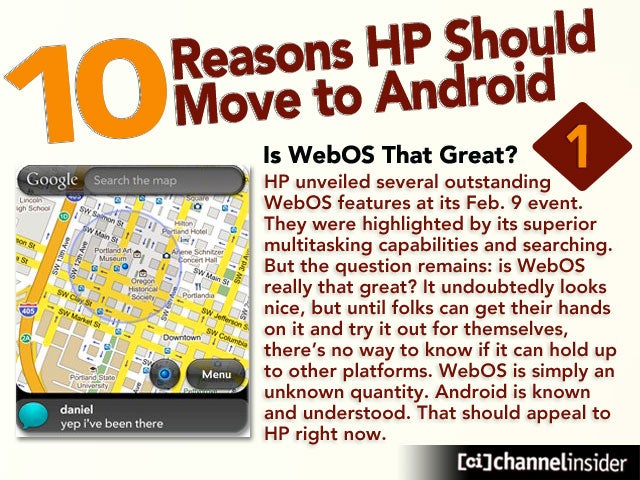 10 Reasons HP Should Move to Android
10 Reasons HP Should Move to Android
1. Is WebOS That Great?HP unveiled several outstanding WebOS features at its Feb. 9 event. They were highlighted by its superior multitasking capabilities and searching. But the question remains: is WebOS really that great? It undoubtedly looks nice, but until folks can get their hands on it and try it out for themselves, there’s no way to know if it can hold up to other platforms. WebOS is simply an unknown quantity. Android is known and understood. That should appeal to HP right now.
 No Title
No Title
2. Consumers Don’t Know WebOSOne of the biggest issues with WebOS is that there is a real mystery surrounding the platform. Consumers don’t necessarily know what to expect from the operating system, and if most were polled, they wouldn’t know what the surveyor was talking about. But Android is well-known and it’s trusted. HP should keep that in mind.
 No Title
No Title
3. Consider CostsThe costs of developing an operating system and maintaining that for the long haul can get out of hand. No single piece of software is perfect, and customers expect major updates every year. If HP opted for Android, it could call on Google to do all that work. But with WebOS, it’s forced to do it all its own. That’s costly and it takes time. And that’s a problem.
 No Title
No Title
4. It’s the Safer PlayGoing with Android is a much safer move for HP than opting to work with WebOS. As mentioned, its platform is unknown by consumers. And the sheer work that goes into making it as appealing as other operating systems in the market just might not be worth it as much as some thing. The safer (and perhaps smarter) play would be to opt for Android.
 No Title
No Title
5. The Enterprise Isn’t ImpressedThe corporate world has been working with HP in several ways over the years. And for the most part, HP has proven that it understands what companies are really after. But it hasn’t done that with WebOS. And the latest iteration it showed off did little in the way to prove to corporate customers that they should want to deploy WebOS. Android isn’t doing much better in the enterprise, but at least it has a head start. And Google seems keen on appealing to corporate customers going forward.
 No Title
No Title
6. It Helps HP Focus More On HardwareBy relying upon Android rather than opting for WebOS, HP has the luxury of focusing much of its time on the hardware that it plans to ship with its desired operating system. That’s a key component in all of this. As all the many Android smartphones have shown, the top devices have the best hardware. If HP focused all of its time on hardware design and implementation, it might be able to push the envelope more than some of the other companies in the space. And most importantly, it just might be able to build a better mobile business on that.
 No Title
No Title
7. The Smartphone ConsiderationSpeaking of smartphones, it’s important to keep in mind that Android is performing exceptionally well in that space. In fact, market research firm Gartner believes the operating system will beat Nokia’s Symbian operating system to become the most popular OS in the mobile space in 2014. That’s a major development. And it could be something that HP could capitalize on with its own line of smartphones. Instead, it’s following through with a relatively unknown operating system.
 No Title
No Title
8. How Does It Compare to iOS?HP needs to consider how its platform compared to Apple’s iOS operating system. Although HP would undoubtedly say that it believes its OS is better than Apple’s, it’s tough to say if consumers would agree. But as Android sales have shown, there are a slew of consumers that do believe Google’s operating system can beat out Apple’s. For HP, not capitalizing on that would seem like a bad idea. Android is a proven success.
 No Title
No Title
9. HP’s History Doesn’t Help MattersHP’s history in the mobile market has been suspect, to say the least. That’s precisely why the company invested in Palm. But given that history, it would only make sense for HP to want to work with a company that has a proven track record of success in the mobile space. And although it spent billions on Palm, it’s Google that it should be partnering with first. Android is a winner. And at least so far, HP hasn’t achieved that same success in the mobile market. It’s time HP acknowledge that and partner with Google.
 No Title
No Title
10. Android 3.0 Has PromiseHP seems content with running WebOS on its upcoming TouchPad, which is expected to hit store shelves in the summer. But Google has an outstanding version of Android coming to tablets in the coming weeks, dubbed Honeycomb, that could deliver even more value to customers. The platform is more desktop-like and comes with the ability for 2D and 3D capability. It’s a major step-up over Android 2.2, and it’s something that HP should capitalize on sooner rather than later.

